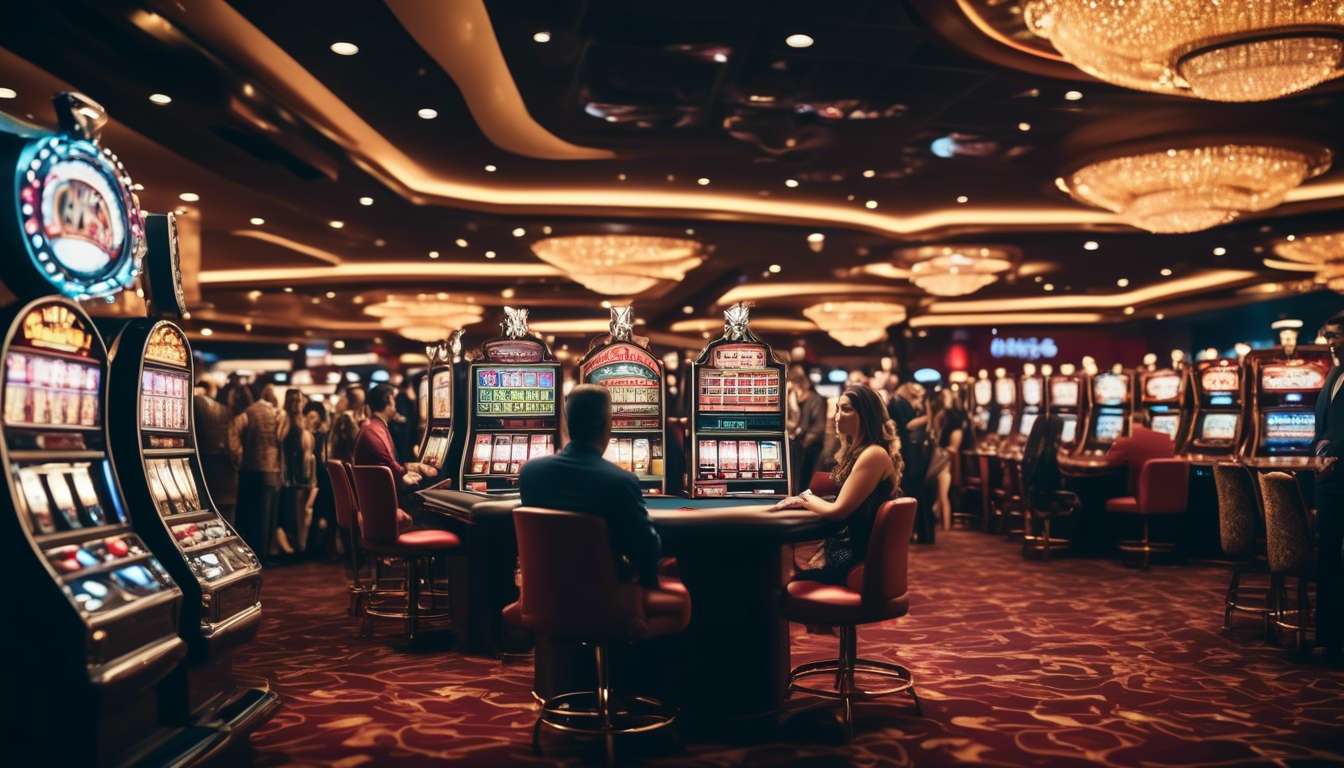The Psychology of Gambling
As we delve into the intricate world of gambling, it’s crucial to understand the psychological forces at play that draw us in and keep us engaged. Our fascination with gambling is not simply about the thrill of winning or losing money; it’s deeply rooted in our human psychology.
Cognitive Biases and Emotional Triggers
We explore the cognitive biases and emotional triggers that influence our behaviors and decisions within the gambling environment. By examining the psychological aspects, we aim to uncover why gambling holds such a powerful sway over so many of us.
The Allure of Gambling
From the allure of the slot machines to the strategic allure of poker, we find ourselves captivated by the unpredictable outcomes that promise both risk and reward. Understanding these elements not only sheds light on our own behaviors but also highlights the importance of responsible gambling practices.
Responsible Gambling
- Understanding cognitive biases
- Recognizing emotional triggers
- Implementing strategies for responsible gambling
Conclusion
Join us as we navigate the complexities of this age-old pastime and uncover what you need to know about the psychology of gambling. By doing so, we aim to promote awareness and encourage responsible engagement with gambling activities.
The Role of Emotions
Emotions and Gambling Behavior
Emotions play a crucial role in influencing our gambling behaviors and decisions. When we gather around the table or engage in a game of chance, we experience a mix of:
- Excitement
- Hope
- Anxiety
These emotions can cloud our judgment, making it harder to make rational decisions.
Impact of Emotions on Decision-Making
We often don’t realize how our feelings intertwine with cognitive biases, leading us down paths we hadn’t planned. In moments of heightened emotion, we might feel invincible, convinced that luck is on our side. This can push us to:
- Make bolder bets
- Chase losses
- Believe a win is just around the corner
Risks of Emotional Gambling
However, this emotional rollercoaster can quickly spiral into addiction if we’re not careful. While the thrill of risk is enticing, it’s crucial to recognize when our emotions are steering us away from reason.
Promoting Healthy Gambling Habits
Together, by understanding the role of emotions, we can make more informed choices and support each other in maintaining healthy gambling habits.
Impact of Cognitive Biases
As we delve into the world of gambling, it’s important to recognize how cognitive biases can skew our perception and decisions. These biases, often intertwined with our emotions, create illusions that make us believe we’re closer to winning than we actually are.
The Gambler’s Fallacy is one such example, where we think the next roll or hand will surely be in our favor because the last few weren’t. These misjudgments, rooted in cognitive biases, can fuel addiction, pulling us deeper into the cycle of gambling.
Together, let’s explore how our shared human tendency to overestimate our control in games of chance can lead us astray. When we gamble, our emotions often cloud our judgment, reinforcing these biases and creating a false sense of certainty.
By understanding these psychological pitfalls, we can better support one another in recognizing and resisting the lure of gambling addiction.
We’re all in this together, striving for clarity and making informed decisions.
Motivations Behind Gambling
Many factors drive people to gamble, from the thrill of winning to the social aspects of the experience. We are often drawn to gambling because it taps into our emotions, offering excitement and a sense of connection with others who share similar interests. The anticipation of a win can create a rush, triggering pleasure centers in our brains and making us crave more.
Our cognitive biases play a significant role as well. These include:
- Overestimating our chances of winning
- Believing in the illusion of control, which makes us feel more confident in our bets
These biases can cloud our judgment, leading us to gamble more than intended.
Addiction is another powerful motivator. Once we’re hooked, gambling becomes a way to escape from stress or negative feelings. It’s a cycle that’s hard to break, especially when our sense of belonging is tied to gambling environments.
As a community, understanding these motivations helps us support each other in making informed choices.
Influence of Rewards and Risks
The Allure of Gambling
The allure of gambling often hinges on the balance between potential rewards and the risks we perceive. We’re drawn to the excitement that comes from the possibility of winning big, which taps into our deepest emotions. This thrill can sometimes cloud our judgment, making us overlook the odds stacked against us.
Cognitive Biases
Our cognitive biases, like the gambler’s fallacy, trick us into believing that past losses increase our chances of future wins, pushing us further into the game.
Emotional Aspects
- Emotionally, we might feel a sense of community when we join others at the table or slot machines, sharing in the highs and lows.
- These emotions can also contribute to risky decisions. We’re not just battling the odds; we’re wrestling with our inner desires for reward and acceptance.
Potential for Addiction
When we gamble, the potential for reward can be intoxicating. Yet, it’s essential to recognize how these elements might lead us down a path towards addiction, affecting our well-being and sense of belonging.
Psychology of Addiction
Gambling’s Impact on the Brain’s Reward System
We often underestimate how gambling can hijack our brain’s reward system, leading to addictive behaviors. As we engage in gambling, our emotions become intertwined with the thrill of anticipation and the allure of potential wins. This emotional rollercoaster can create a sense of community with others who share similar experiences, fostering an environment where addiction quietly thrives.
Role of Cognitive Biases
Cognitive biases play a significant role in this process. We might convince ourselves that:
- We’re due for a win
- Our luck is just around the corner
These beliefs persist despite evidence to the contrary. These biases distort our perception of reality, reinforcing the cycle of addiction.
Cycle of Addiction
In our pursuit of connection and excitement, we may overlook how deeply gambling affects our lives, creating a cycle that’s hard to break.
Support and Understanding
By understanding the psychological underpinnings, we can better support one another in:
- Recognizing the signs of addiction
- Offering compassion and aid to those in our community who need it
Impulse Control and Decision-Making
Our Ability to Control Impulses
Our ability to control impulses and make decisions is crucial in resisting the lure of gambling. When we gamble, our emotions often take the wheel, driving us towards decisions we might not otherwise make.
The Role of Emotions
Emotions like excitement and frustration can cloud our judgment, making it harder to resist the temptation of placing just one more bet. In these moments, cognitive biases kick in, convincing us that we’re just one win away from turning it all around.
The Need for Belonging and Support
We all want to belong, to be part of a group that understands and supports us. Recognizing how addiction can distort our decision-making process helps us take a step back and regain control. By understanding the psychological factors at play, we empower ourselves and each other to make informed choices.
Building Stronger Impulse Control
Together, we can challenge the rush of emotions and cognitive biases that fuel gambling urges. Let’s support one another in:
- Building stronger impulse control
- Making decisions that align with our best interests
Social Influences on Gambling Behavior
Social Environments and Peer Pressure
Many of us underestimate how social environments and peer pressure can significantly influence our gambling behaviors. When surrounded by friends who gamble, we might feel compelled to join in, seeking acceptance and camaraderie. This sense of belonging can sometimes cloud our judgment, making us more susceptible to acting on emotions rather than rational decisions.
Cognitive Biases in Social Settings
In these social settings, cognitive biases often come into play, leading us to:
- Overestimate our chances of winning
- Believe that we’re on the verge of a big win, simply because others around us are sharing their own success stories
This can create a cycle where we gamble more frequently, hoping to match or surpass our peers.
Risk of Addiction
Moreover, constant exposure to gambling within our social circles can exacerbate the risk of developing an addiction. The shared excitement and mutual encouragement can make it difficult to recognize when our behavior becomes problematic.
Navigating Social Influences
By understanding these social influences, we can better navigate our gambling experiences and maintain healthy relationships.
Strategies for Responsible Engagement
To engage responsibly in gambling, we should establish clear boundaries and remain mindful of our motivations. By doing so, we create a supportive community where everyone feels included and respected.
It’s crucial to recognize how our emotions can influence our decisions. When we’re aware of feelings like excitement or frustration, we can pause and evaluate whether we’re gambling for fun or if we’re leaning towards unhealthy patterns.
Cognitive biases often lead us to overestimate our chances of winning. By acknowledging these biases, we empower ourselves to make more informed choices.
Let’s also remember the importance of setting time and budget limits to prevent the slippery slope toward addiction.
- Set specific time frames for gambling sessions.
- Establish a budget that you can afford to lose.
- Stick to your limits regardless of wins or losses.
Sharing these strategies with our peers can foster a sense of belonging, helping each of us to stay accountable.
Together, we can enjoy gambling as a form of entertainment while ensuring it remains a positive experience that doesn’t compromise our well-being.
How does the design of gambling environments affect player behavior?
When we look at how the design of gambling environments impacts player behavior, we see a direct correlation between the two.
The layout, colors, and sounds within these spaces are strategically crafted to:
- Enhance excitement
- Encourage prolonged engagement
Such elements can trigger emotional responses, leading players to:
- Take more risks
- Potentially spend more money
It’s essential to recognize these influences to make informed decisions while engaging in gambling activities.
What are the neurological effects of gambling on the brain?
Dopamine and Gambling
When we gamble, our brains experience a rush of dopamine, a neurotransmitter associated with pleasure and reward. This surge can lead to feelings of excitement and euphoria, reinforcing the behavior.
Impact on Decision-Making and Impulse Control
However, extended gambling can also affect brain regions responsible for decision-making and impulse control. This alteration can potentially lead to addictive behaviors.
Making Informed Choices
Understanding these neurological effects can help us:
- Make informed choices about our gambling habits
- Prioritize our mental well-being
By recognizing the impact of gambling on our brains, we can better manage our behaviors and maintain a healthy balance.
How do cultural differences impact gambling practices and attitudes?
Cultural differences play a significant role in shaping gambling practices and attitudes. Our beliefs, traditions, and societal norms influence how we perceive gambling.
These differences can impact:
- The types of games people prefer
- The frequency of gambling activities
- The stigma associated with gambling
Understanding these cultural nuances is crucial in creating inclusive and effective gambling interventions that resonate with diverse populations.
It’s important to respect and consider these differences when addressing gambling-related issues.
Conclusion
As you navigate the world of gambling, remember that emotions, cognitive biases, motivations, and social influences all play a role in your choices.
Understanding the psychology behind gambling can help you make more informed decisions and engage in a responsible manner.
By being aware of the risks and rewards, practicing impulse control, and seeking support when needed, you can enjoy the experience while safeguarding your well-being.
- Stay informed
- Stay in control
- Gamble responsibly

